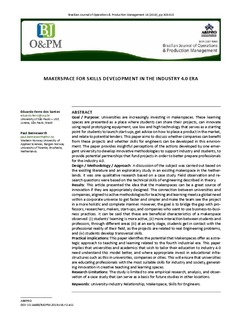| dc.contributor.author | Dos Santos, Eduardo Ferro | |
| dc.contributor.author | Benneworth, Paul | |
| dc.coverage.spatial | Netherlands, Twente | nb_NO |
| dc.date.accessioned | 2019-06-04T07:18:38Z | |
| dc.date.available | 2019-06-04T07:18:38Z | |
| dc.date.created | 2019-06-03T10:51:44Z | |
| dc.date.issued | 2019 | |
| dc.identifier.citation | Benneworth, P., & Dos Santos, E. F. (2019). Makerspace for skills development in the industry 4.0 era. Brazilian Journal of Operations & Production Management, 16(2), 303-315. | nb_NO |
| dc.identifier.issn | 1679-8171 | |
| dc.identifier.uri | http://hdl.handle.net/11250/2599814 | |
| dc.description.abstract | Goal / Purpose: Universities are increasingly investing in makerspaces. These learning spaces are presented as a place where students can share their projects, can innovate using rapid prototyping equipment, use low and high technology that serves as a starting point for students to launch start-ups, get advice on how to place a product in the market, and relate to potential lenders. This paper aims to discuss whether companies can benefit from these projects and whether skills for engineers can be developed in this environment. The paper provides insightful perceptions of the actions developed by one emergent university to develop innovative methodologies to support industry and students, to provide potential partnerships that fund projects in order to better prepare professionals for the industry 4.0.
Design / Methodology / Approach: A discussion of the subject was carried out based on the existing literature and an exploratory study in an existing makerspace in the Netherlands. It was one qualitative research based on a case study. Field observation and research questions were based on the technical skills of engineering described in theory.
Results: This article presented the idea that the makerspaces can be a great source of innovation if they are appropriately designed. The connection between universities and companies, aligned to active methodologies for teaching and learning meets a global need within a corporate universe to get faster and simpler and make the team see the project in a more holistic and complete manner. However, the goal is to bridge the gap with professors, researchers, makers, start-ups, and companies who want to use business-to-business practices. It can be said that these are beneficial characteristics of a makerspace observed: (i) students' learning is more active, (ii) more interaction between students and professors, through different areas (iii) at an early stage, students get in contact with the professional reality of their field, as the projects are related to real Engineering problems, and (iv) students develop transversal skills.
Practical implications: This paper identifies the potential that Makerspaces offer as a strategic approach to teaching and learning related to the fourth industrial era. This paper implies that universities and academics that wish to tailor their education to industry 4.0 need understand this model better, and where appropriate invest in educational infrastructures such as this in universities, companies or cities. This will ensure that universities are educating professionals with the most suitable skills for industry and society, generating innovation in creative teaching and learning spaces.
Research Limitations: The study is limited to one empirical research, analysis, and observation of a case study that can serve as a basis for future studies in other locations. | nb_NO |
| dc.language.iso | eng | nb_NO |
| dc.rights | Navngivelse 4.0 Internasjonal | * |
| dc.rights.uri | http://creativecommons.org/licenses/by/4.0/deed.no | * |
| dc.subject | university-industry relationship | nb_NO |
| dc.subject | makerspace | nb_NO |
| dc.subject | skills for engineers. | nb_NO |
| dc.title | Makerspace for skills development in the industry 4.0 era | nb_NO |
| dc.type | Journal article | nb_NO |
| dc.description.version | publishedVersion | nb_NO |
| dc.source.pagenumber | 303-315 | nb_NO |
| dc.source.volume | 16 | nb_NO |
| dc.source.journal | Brazilian Journal of Operations & Production Management | nb_NO |
| dc.source.issue | 2 | nb_NO |
| dc.identifier.doi | 10.14488/BJOPM.2019.v16.n2.a11 | |
| dc.identifier.cristin | 1702230 | |
| cristin.unitcode | 203,13,3,0 | |
| cristin.unitname | Institutt for økonomi og administrasjon | |
| cristin.ispublished | true | |
| cristin.fulltext | original | |

